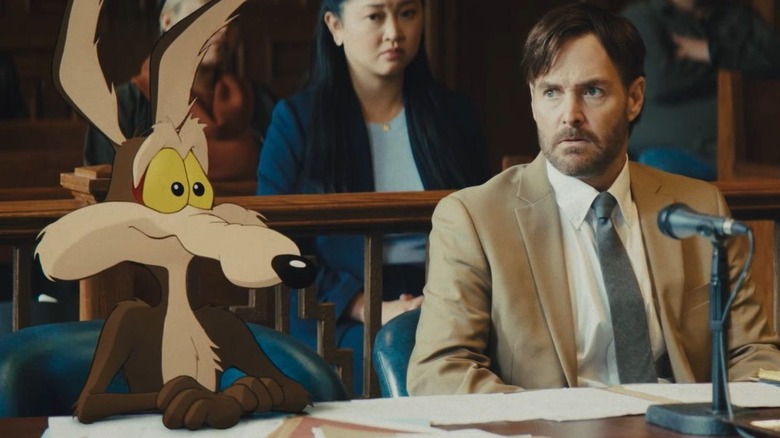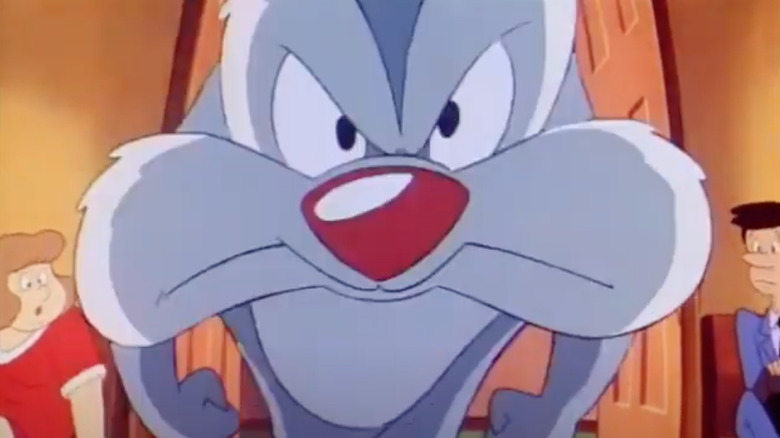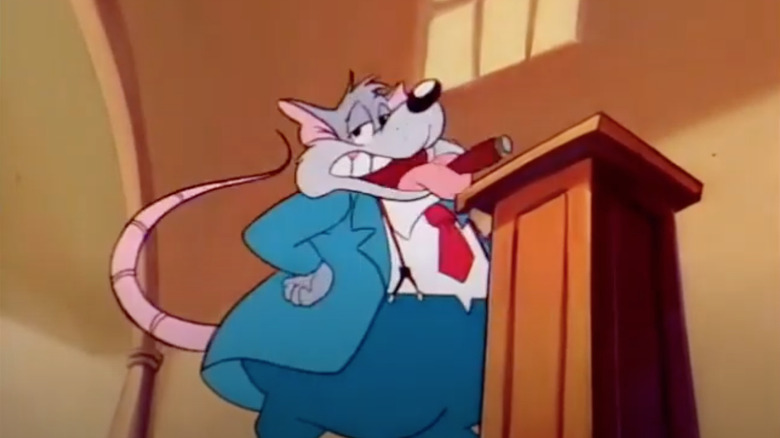Coyote Vs. Acme Has Been Vanished, But You Can Watch One Of The Best Tiny Toons Episodes Instead
It's looking less likely with each passing day that a mass audience will be able to see Dave Green's comedy film "Coyote vs. Acme." Despite being complete, Warner Bros. infamously decided to cancel the film's release — and delete it from existence — just to obtain a massive tax write-off. The few Hollywood insiders who have seen "Coyote vs. Acme" have gone on the record, assuring audiences that it's good. Meanwhile, WB has reportedly received multiple offers for the film from other studios, yet has rejected each and every one of them. It seems "Coyote vs. Acme" is doomed to become yet another lost film, sacrificed on the alter of the Bottom Line. It makes one wonder how many other films have been similarly deleted.
The premise of "Coyote vs. Acme" was fun. Wile E. Coyote — the voracious carnivore who debuted in Chuck Jones' 1949 short film "Fast and Furry-ous" — frequently mail-ordered unusual products (from pills to catapults) from the mysterious Acme corporation, hoping to use the products to capture and eat an elusive roadrunner. Jones, throughout his 20-odd Coyote shorts, was careful to depict the Acme products consistently backfiring, usually doing grievous bodily harm to the Coyote. "Coyote vs. Acme" was to bring the Coyote into the real world to take the Acme corporation to court, suing it for selling shoddy products. The idea was inspired by a February 1990 New Yorker article called "Coyote v. Acme" written by Ian Frazier.
The concept, it seems, has also already been adapted for the small screen. In an episode of "Tiny Toon Adventures" titled "K-ACME TV" (February 26, 1991), the show's coyote character, Calamity Coyote, angrily sued Acme for selling consistently shoddy concoctions.
K-ACME TV
To remind readers: "Tiny Toon Adventures" was a Steven Spielberg-produced spinoff of Looney Tunes that featured brand new "kid" versions of the classic cartoon characters. They weren't younger versions of the Looney Tunes but a new generation of upcoming cartoon stars who took classes at Acme Looniversity (classes taught by the likes of Bugs Bunny, Daffy Duck, Porky Pig, and all the rest). The Tiny Toons were also ultra-hip '90s kids who regularly broke the fourth wall and commented on their status as cartoons; in more than one episode, the Toons left their show and went to the Warner Bros. lot to talk to Spielberg in person. That element of self-awareness would prove to be a defining characteristic of 1990s pop media. "Tiny Toons" was ahead of its time.
The first-season episode "K-ACME TV" was a fast-moving parody of many, many TV shows and commercials that were hip in 1991. There were spoofs of Lucky Charms, "I Love Lucy," "Jeopardy!," and "The Wonder Years." Some of the gags only lasted three seconds, while others were full minutes-long sequences. It's one of the better episodes of "Tiny Toon Adventures."
The "Tiny Toons" version of "Coyote vs. Acme" was presented as a spoof of the long-running courtroom reality series "The People's Court," which — in its initial iteration — debuted in 1981 and ran until 1993. Naturally, it was called "The Toon Court." The on-screen plaintiff was Calamity Coyote, who angrily sued Acme for selling negligence and faulty workmanship. Acme's representative was Bobbo Acme, a cigar-chomping rat in a suit. His defense was that Acme products worked perfectly well and that Calamity was merely using them improperly. The judge was Yosemite Sam, who wielded a hangman's noose.
The Toon Court
Judge Yosemite Sam asked for a demonstration of Acme's substandard products, and Calamity happened to have one of their catapults in court. He sat in the payload bucket — as Wile E. Coyote so often did in the old Roadrunner cartoons — and pulled a lever. Calamity stayed stationary while the entire base of the catapult flipped out from under him and then crashed down on his head. Bobbo Acme, however, pointed out that Calamity did it wrong. He put Calamity in the bucket, pulled the lever, and launched him out a window. "See?" he said in the smarmiest possible way, "It works." Calamity wandered back into the courtroom in just enough time to hear the Judge declare Acme to be innocent. The judge's gavel broked when he smashed it down, and the hammer thwacked Calamity in the head. "Why me?" he wondered.
One of the defining characteristics of both Wile E. Coyote and Calamity Coyote was that they were incredibly unlucky. While they were often undone by their own unhealthy appetites for roadrunner meat, they were just as often the victims of unfortunate circumstances. It was fitting that they never won; the Roadrunner — or the "Tiny Toons" version, Little Beeper — was never captured and the Coyotes remained hungry.
The "Toon Court" spoof in "K-ACME TV" already incorporated everything we might need to see from "Coyote vs. Acme." The feature would have boasted more elaborate visuals, of course, as the Coyote was to attend court in a live-action universe, but the story is handily contained in the two-minute version from 1991.
The only surprise "Coyote vs. Acme" might have pulled was allowing Wile E. Coyote to win ... and that wouldn't have felt right. The Coyote is a sad figure, a Greek Tragedy hero constantly undone by his ambitions, his appetites, and the merry indifference of fate.
It still would have been nice to see and find out.


